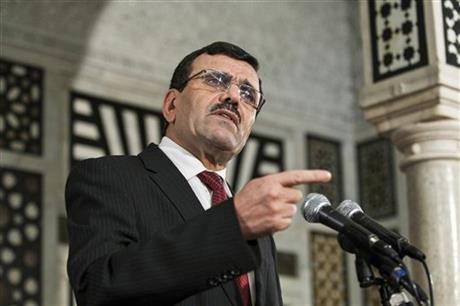
By BOUAZZA BEN BOUAZZA
Tunisian Prime Minister Ali Larayedh addresses reporters during a press conference held in Tunis, Tunisia, Tuesday Aug. 27, 2013. Ali Larayedh said that the salafist group Ansar al-Sharia was considered a terrorist organization, based on seized documents, confessions and weapons captured from group members. The group is believed to have helped to orchestrate an attack last September on the U.S. Embassy.(AP Photo/Amine Landoulsi)
TUNIS, Tunisia (AP) — Tunisia’s prime minister on Tuesday branded an ultraconservative Islamist group implicated in last year’s U.S. Embassy attack as a terrorist organization with links to al-Qaida.
Ali Larayedh said in a press conference that the salafi group Ansar al-Shariah was considered a terrorist organization based on seized documents, confessions and weapons captured from group members. The designation means that membership in Ansar al-Shariah is now a crime.
“There will be no respite in the struggle against terrorists and against those who take up arms against the citizens and institutions of the state,” he said. “We will ensure Tunisians have a future characterized by freedom and wellbeing.”
The group is believed to have helped to orchestrate an attack last September on the U.S. Embassy by protesters angered by a U.S. film mocking Islam; four assailants were killed in the clashes.
The government has also said members of the group were involved in the assassination of two opposition politicians this year and are cooperating with armed militants fighting the army in the mountainous Jebel Chaambi region along the Algerian border.
The group’s leader, Seifallah Ben Hassine, fought the Soviets in Afghanistan and was later imprisoned by the former Tunisian regime until his release following the revolution that overthrew the secular dictatorship. He is once more in hiding.
Larayedh urged members of the group to quit or face prosecution.
Following the overthrow of dictator Zine El Abidine Ben Ali, religious groups flourished in Tunisia with the election victory of the moderate Islamist Ennahda Party and the rise of conservative salafi groups calling for greater piety in society.
Many of the salafi groups resorted to violence and intimidation to push their views and included former militants in their ranks. After being accused by the opposition of turning a blind eye to salafi excesses, the Islamist-led government finally moved to confront them.
Ansar al-Shariah’s annual conference was banned last May, provoking clashes between police and the group’s supporters.
As the birthplace of the Arab Spring and home to a relatively educated population, Tunisia’s transition to democracy is being closely watched.
The process has stalled following the latest political assassination in July and nearly a third of the members of the elected assembly have withdrawn, calling for a new technocratic government. There have been fears that the transition could be derailed as happened in Egypt.
Larayedh restated Ennahda’s position that the current government would first finish the constitution and the electoral law by October before handing over the actual running of the elections by the end of the year to a new government agreed through a national dialogue.
The opposition has rejected this proposal and is holding anti-government demonstrations throughout the week.
“These demonstrations in public spaces and the mobilization on the street are not democratic moves. It is not in the streets that we resolve our difference but through institutions,” said the prime minister.


